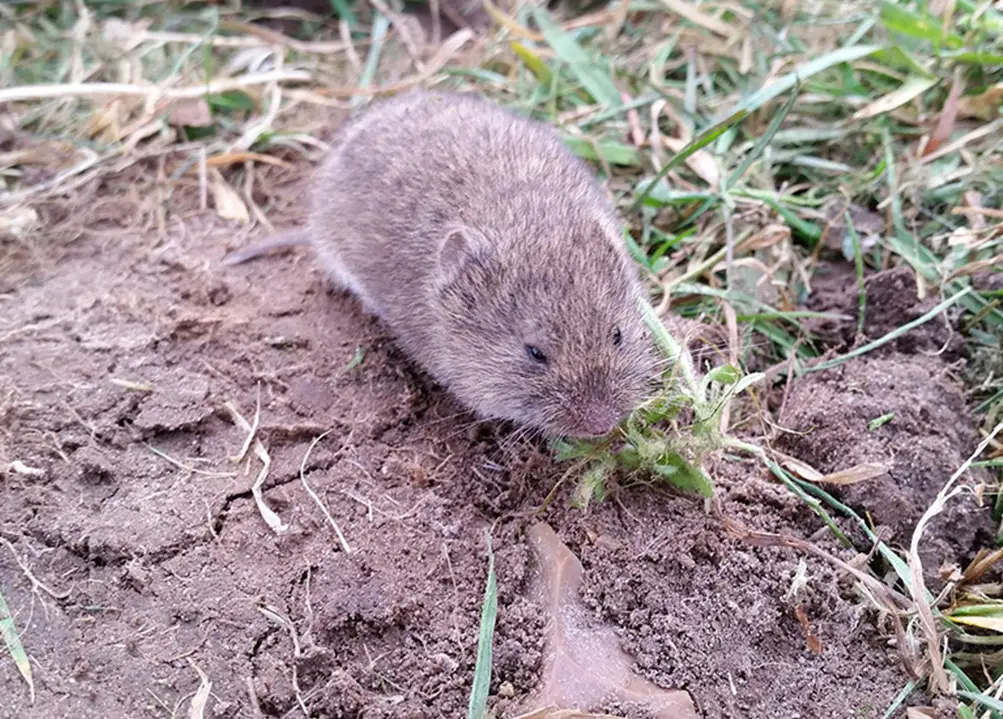Cougarstone Lawn Care is Here to Help You With Your Vole Infestation
Voles can cause significant damage to lawns and landscapes in Calgary, often going unnoticed until the damage is severe. These small rodents are relatively unknown to many homeowners, but they can quickly devastate your yard. If left untreated, voles can leave your lawn in disrepair, causing frustration and costly repairs. At Cougarstone Lawn Care, we have the solution to your vole infestation and can help you protect and restore your lawn.
Visit our Vole Control page or call 403-324-5296 to book a vole treatment.
What Are Voles?
Voles (Microtus pennsylvanicus), often mistaken for field mice, are small rodents that are highly active in Calgary’s outdoor environments. Unlike mice, voles have shorter tails and thrive in cold climates, making them particularly prevalent in Calgary. These pests are vegetarians, feeding primarily on grass, shrubs, and tree bark, which makes them a significant threat to your lawn and landscape.
Vole populations can explode quickly due to their high reproduction rate. Female voles can have up to 10-17 litters per year, with each litter producing 4-6 young. This rapid reproduction means that a small vole problem can escalate into a full-blown infestation in a short period.

What Do Voles Do?
Voles love to establish their habitats under sidewalks, driveways, and patios, where they find protection and easy access to food. During the winter, snow cover provides them with the security to create surface vole tunnels that lead from their dens to your lawn. These surface runways are often visible once the snow melts, revealing the extensive damage they have caused to your grass.
As voles feed on grass, tree bark, and shrubs, they create dead grass patches and damage to your landscape. Their feeding habits can also expose the roots of plants, leading to further deterioration of your lawn and garden.
Voles vs. Mice: Key Differences
Voles and mice are often confused, but they have distinct characteristics that set them apart. Meadow voles, prairie voles, heather voles, water voles, and mountain voles are outdoor rodents with stocky bodies and small ears often hidden by fur. In contrast, the house mouse has a slender body, prominent ears, and a longer tail.
Voles create surface runways and burrows in lawns, while mice are more likely to invade homes. A meadow vole/prairie vole, sometimes called meadow mice, are herbivores that damage lawns and plants, unlike the omnivorous house mouse. To identify voles, look for their distinctive runways and burrow entrances outdoors, especially near grass, shrubs, and fruit trees.
How Do I Prevent Voles?
Calgary is beginning to see large vole populations and reducing vole populations has become top of mind for many homeowners. Preventing a vole infestation in Calgary requires a proactive approach that includes maintaining your lawn and reducing the conditions that voles find attractive.
Clean Up Debris and Hiding Spots
Voles are attracted to areas where they can find shelter and food. To deter voles, regularly inspect your yard and remove any debris that could provide them with cover. This includes woodpiles, yard tools, and compost. By eliminating these hiding places, you reduce the chances of voles establishing a habitat on your property.
Perform Proper Fall Lawn Care
Fall is a critical time to prepare your lawn for winter and prevent voles from taking over. Before winter sets in, perform a thorough fall cleanup by removing all leaves and debris from your yard. Mow your lawn short, ideally to 1.5 inches, as this will help eliminate the food source that voles seek before winter.
Consider Natural Deterrents
There are a few natural techniques that can help deter voles from settling in your yard. These include using steel wool, used cat litter, or castor oil in their holes. While these methods can provide temporary relief, they are often only partially effective and may need to be supplemented with more comprehensive control measures.
How To Get Rid of Voles
If you have already noticed vole damage or suspect an infestation, immediate action is necessary. Voles are persistent and challenging to control, but professional pest control services can effectively manage and eliminate vole populations. Professional services offer several advantages:
- Effective Control Programs: Professionals have access to effective vole control programs that will eliminate voles from your property.
- Comprehensive Assessment: They will assess the extent of the infestation and implement a targeted strategy for your yard.
- Access to Professional Products: You’ll gain access to products not available in stores, ensuring more effective treatment.
- Ongoing Monitoring: A good vole control program will include regular monitoring of bait boxes throughout the year to ensure the problem does not return.
Call Cougarstone Lawn Care for Vole Control
If you’re wondering how to get rid of voles/moles permanently, call Cougarstone Lawn Care.
We offer one of the most comprehensive and effective vole control programs in Calgary. We understand how frustrating a rodent issue can be, which is why we’ve developed a program that takes the guesswork out of vole control. We service several hundred yards each year, helping our clients maintain beautiful, vole-free lawns.
For a full-season vole control program that includes 4-6 bait boxes, monitoring, and bait refills, you can expect to pay between $350-$500 for a standard yard. For more information call 403-324-5296 or book your free assessment now.
FAQS
What do voles look like?
Voles are small rodents, similar to field mice, but with shorter tails and smaller ears. They are typically brown or gray and have compact, stocky bodies.
What causes voles?
Voles are attracted to areas with ample ground cover, such as tall grass, shrubs, and woodpiles, where they can find shelter and food. Poor lawn maintenance can also make your yard more susceptible to voles.
How to get rid of voles naturally?
Natural methods to deter voles include using steel wool, used cat litter, or castor oil in their tunnels. However, these methods are usually only temporarily effective and should be combined with other control measures.
How to kill voles?
Voles can be effectively eliminated using professional-grade bait traps and poisons, which are best applied by certified pest control professionals.
How to treat voles?
Treat voles by first identifying the infestation and then applying appropriate baits or poisons. Regular monitoring and maintenance are key to preventing future infestations.
What do voles eat?
Voles primarily eat grass, roots, seeds, and tree bark. They also feed on shrubs and other vegetation, causing significant damage to lawns and gardens.
Do vole populations naturally fluctuate?
Yes, vole populations cycle every 3 to 5 years, with periodic population booms. Mild winters with good snowfall can increase vole populations by providing them with better survival conditions.
Are voles dangerous?
Voles are not typically dangerous to humans, but they can cause significant damage to lawns, gardens, and landscaping by feeding on grass, roots, and tree bark. Their burrowing can also harm plants and disrupt soil structure.


